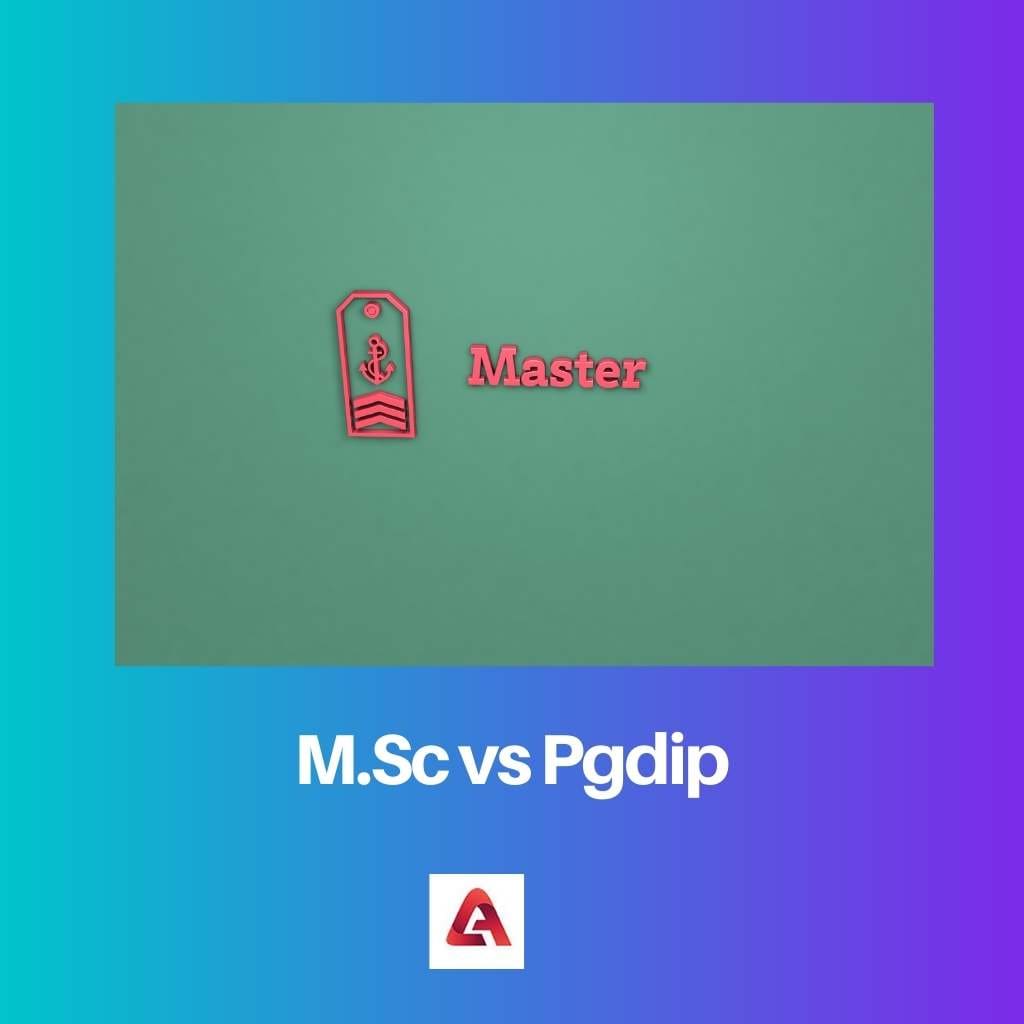There are different courses and degrees that students are pursuing all around the world. Nowadays, students have varied interests, due to which several specializations have come into the picture.
M.Sc, also known as Master of Science, and Pgdip, also known as Post Graduate Diploma, are two very common degrees in India and even around the world.
Key Takeaways
- M.Sc is a Master of Science degree, while PGDip is a Postgraduate Diploma.
- M.Sc requires the completion of a research project or thesis, whereas PGDip focuses on coursework without a research component.
- M.Sc degrees take longer to complete (1-2 years) than PGDip programs (6 months to 1 year).
M.Sc vs Pgdip
M.Sc. stands for Master of Science, which is an academic degree that requires one or two years of study after the completion of a bachelor’s degree. Pgdip stands for Postgraduate Diploma, which is a shorter, more focused program that can be completed in one year. Pgdip programs are more vocational and practical in nature.

M.Sc, which is also known as Masters of Science, is a postgraduate degree that has several disciplines. M.Sc in Physics, M.Sc in Chemistry, and M.Sc in Botany are a few such specializations.
A person who wishes to apply for M.Sc in a respective discipline must have a bachelor’s degree in Science, popularly known as B.Sc in that particular discipline.
PGDip, also known as Postgraduate in Diploma, is a one-year course that most universities offer worldwide.
An individual who wishes to pursue a PGDip needs to have completed a bachelor’s degree in the respective discipline in which he wishes to pursue his PGDip.
Comparison Table
| Parameters of Comparison | M.Sc | Pgdip |
|---|---|---|
| Expanded Form | M.Sc is also known as Masters of Science. | PGDip is also known as Postgraduate Diploma. |
| Eligibility | A person who wishes to pursue M.Sc in a particular discipline must have completed a B.Sc in the respective discipline. For example, a person who wishes to pursue M.Sc in Physics must have completed B.Sc in Physics. | An individual who wishes to pursue PGDip must have completed a bachelor’s degree in any discipline but may always have to pass an entrance examination of a university or college he wishes to enter. |
| Course duration | M.Sc is a two-year degree. | PGDip is a one-year degree, but some colleges conduct them as a 2-year course. |
| Subjects taught | In M.Sc, the subjects taught are related to science subjects like Physics, Chemistry, and Zoology. | In PGDip, the subjects that are taught are related to the course one has chosen. General subjects like History and Geography may be taught depending on which discipline a person does his PGDip. |
| Employment Opportunities | After completing M.Sc, employment opportunities include research assistants, teachers, and professors in Science subjects like Physics and Chemistry. | The employment opportunities after completing PGDip are educators and teachers in the respective subjects in which they have completed their diplomas. |
What is M.Sc?
M.Sc is a master’s degree in Science that various universities offer all across the world. The University of Michigan was the first university to start a master’s degree in Science, which they termed as M.Sc.
This degree lasts 2 years, and the time duration remains constant globally.
Normally, M.Sc is focused on a particular subject or discipline. M.Sc in Physics and M.Sc in Chemistry are two of the most popular specializations in India.
A person who has completed his Intermediate in the Science stream pursues Btech or B.Sc as their bachelor’s and students who complete their B.Sc becomes eligible to apply for M.Sc.
The advantages of doing an M.Sc are:-
- The probability of getting a job after doing an M.Sc is much higher as compared to a B.Sc.
- The scope of learning and coverage of subjects in M.Sc is advanced when compared to a B.Sc.
- Doing an M.Sc from a premier institution may be a dream come true for many individuals.
What is Pgdip?
PGDip is also known as Postgraduate Diploma, is a one-year degree that many universities offer all around the world.
PGDip can be pursued in 1000s of subjects and disciplines as per the individual’s area of interest.
PGDip is closest to the Master’s degree as they contain 120 credit points, whereas a Master’s degree contains 180 credit points.
A diploma is not a degree but has its features and merits. The advantages of doing a PGDip are:-
- The duration of a diploma is short.
- A diploma boosts an individual’s qualification after his bachelor’s degree.
- The competition of PGDip may also put forward various employment opportunities for an individual.
The employment scope after completing a diploma is basically in the line of teaching and research work. There are various subjects in which one can pursue a diploma, like a History, Geography, and Physics. A person must try to pursue his/her diploma from a well-known and reputed institution.
Main Differences Between M.Sc and Pgdip
- M.Sc is also known as Masters of Science, whereas PGDip is also known as Postgraduate Diploma.
- M.Sc is a master’s degree of 2 years duration, whereas PGDip is a diploma of a single year.
- An individual who wishes to pursue an M.Sc must have successfully completed a Bachelor’s Degree in Science, popularly known as B.Sc, whereas an individual who wishes to pursue PGDip must have completed a Bachelor’s degree in any discipline.
- The subjects taught in M.Sc are Science-oriented. On the other hand, in PGDip, subjects taught are of the particular discipline in which a person is pursuing his PGDip.
- M.Sc offers comparatively more employment opportunities when compared to a PGDip.




